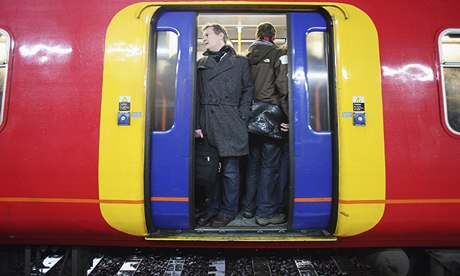Train operators invest little cash but take massive profits. This wasn't what the Tories promised

A London commuter train: no free seats, no free Wi-Fi – but good news for shareholders. Photograph: Dan Kitwood/Getty Images
"It needs access to private capital, access to private management, it needs more money into the business, and all this will become possible." David Cameron on Royal Mail, October 2013
As they flog our public assets, government ministers always promise one thing: that they will be better cared for by the new private owners. Sure, they may look like hedge funds out for a fast buck, but we must consider them investors, who will plough in their own millions to burnish the family silver.
Thatcher said it in the 80s; and now, during this second coming of popular capitalism, her grandchildren are saying it too.
While giving away Royal Mail at a bargain-basement price, David Cameron promised the result would be a flood of private cash. When a unit supplying the NHS with blood was handed over to private equity, Jeremy Hunt's officials pleaded the need for investment. And you'll hear that justification over and over again, as the coalition privatises a further £15bn worth of companies, departments and assets currently held by the public.
Never mind ownership, ministers will soothe us: lie back and think of the investment. So let's do that. Let's go back to the last great privatisation and see how much investment it yielded.
Tuesday marks the 20th anniversary of rail privatisation, the day when the government finally pushed through the legislation to break up and sell off our train services. Throughout the flotation process, successive transport ministers pointed at the goodies to come. Take this reliably bouffant pledge from Steve Norris: "There is not the slightest shadow of doubt that, freed from the constraints of public sector financing, train operators … will generate substantially greater investment in the railways because of the privatisation of British Rail."
Was he right? I asked academics at the Centre for Research on Socio-Cultural Change (Cresc) to calculate how much companies such as Virgin and First Group are investing in their services. They looked at their return on capital employed, which is to say the amount train operators made on the money tied up in their business. A low ratio would indicate an industry doing as Norris and his colleagues foretold: ploughing cash into delivering a better service. A really high ratio would indicate the opposite: barely any cash going in.
The figures are astonishing. In the financial year ending in March 2012, the train companies gained an average return of 147% on every pound they put into their business. Forget about high: that is stratospheric. It suggests that – despite all the promises made by the freshly rehabilitated John Major – the train operators are investing barely anything, but making bumper returns.
If you're a pensioner, imagine a savings account that promised to give you next year a 147% return on your cash, rather than the 1% you'll typically get now. If you're a first-time buyer, imagine selling up next year at a 147% markup – impossible even in primest, most central London.
Other businesses would kill for the kind of low-investment, high-returns that Arriva, Stagecoach and the rest are making from their train sets. Big supermarkets get about £1.08 back for every quid they put in: all that stock ties up a lot of cash. Even the supposed profiteers over at Barclays would punch the air at a 10% return. For every pound the railway barons put in, they get £2.47 back.
And that most recent figure isn't a fluke. The Cresc team went back all the way to the start of the electronic database in 2004, and found that year after year the pre-tax return on capital employed was never less than 100%. Just as remarkable are the train operators' dividends: pretty much all the profit after tax was paid to shareholders.
No wonder Richard Branson is a billionaire with his own private island. No wonder Tim O'Toole, boss of FirstGroup, and Brian Souter, head of Stagecoach, are on more than a million quid a year each. They are rewarded handsomely for handing over every spare penny to their shareholders.
But by the same token, no wonder passengers in cattle class can't get free Wi-Fi, or even a seat on the evening train out of Euston: there's no cash left to make the services worth the often excessive fares. The really big improvements, such as the west coast mainline upgrade now enjoyed by Branson's business, are funded by taxpayers. Heads they win, tails we lose.
A train lobbyist reading this (hi there!) will tell you that measuring investment by the operators is barking up the wrong tree. Arriva and the rest are essentially commissioned by the government to run a line. But that ignores three things. First, the industry never stops banging on about its role as an "investor". Second, free cash without having to pony up much actual investment is very welcome to the Branson empire, among others.
And finally, if the operators are merely there as middlemen, to sell us tickets and clip them, then why do we need them? Specifically, why is Cameron so desperate to give the publicly-run east coast mainline to the private sector?
Capitalism is meant to be about private firms taking risks and reaping the rewards. The rail network on the other hand is about the public taking the risk and racking up huge debts, even while the private firms reap excessive rewards.
Look at those investment return figures again: that isn't the triumph of liberalisation; that's legalised larceny. It hardly bodes well for the next wave of sell-offs.

No comments:
Post a Comment